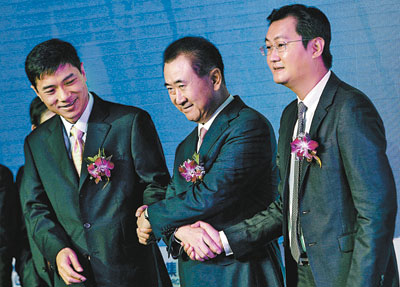|

JACK MA is the Chinese mainland’s richest person.
The 49-year-old founder and chairman of Alibaba Group Holding Ltd. has a net worth of US$21.8 billion, according to the Bloomberg Billionaires Index. His assets include a 7.3 percent economic interest in China’s largest e-commerce business, which is preparing for what could be the largest initial public offering in U.S. history, and almost half of the parent of Alipay, a separate online-payment service that previously hadn’t been included in his net worth calculation.
Ma is US$5.5 billion richer than Ma Huateng (Pony Ma), the founder of Tencent Holdings Ltd., China’s largest Internet company by market value. Robin Li, the founder of search engine Baidu Inc., ranks No. 3 in the world’s second-largest economy.
“The wealth creation in China has been quite rapid, particularly among entrepreneurs such as Jack Ma who have created businesses that benefit from China’s burgeoning middle class,” said Tony Hsu, a Shanghai-based portfolio manager at Dalton Investments.
Alibaba, which plans to sell shares on the New York Stock Exchange next month, may set its IPO value at US$154 billion, according to the average estimate of five analysts surveyed by Bloomberg in July. Ma owns 8.8 percent of the company. After subtracting the 1.5 percent controlled by SymAsia Foundation Ltd., his charitable organization, Ma’s interest in the company is valued at US$11.3 billion.
The same analysts said Alibaba’s post-listing valuation could be as much as US$200 billion.
Ma also owns 48.5 percent of Zhejiang Ant Small & Micro Financial, a closely held entity that operates the Alipay online-payment service. The Hangzhou, China-based company has a value of US$25 billion, based on the average estimate of seven analysts surveyed by Bloomberg News.
The billionaire’s stake in Small & Micro is expected to dilute to no more than 8.9 percent in three to five years by selling new shares or distributing stock to employees, the company said in an Aug. 12 filing with the U.S. Securities and Exchange Commission. Ma won’t realize any economic benefit from these transactions, the filing said.
Alibaba also is entitled to acquire as much as a third of Small & Micro, according to the filing, though the e-commerce firm can’t assure investors it will receive the approval from Chinese regulators for the transaction.
Ma is credited with the full stake in Small & Micro. Six of seven analysts surveyed said his net worth should be calculated based on his current interest and adjusted as his stake changes. Based on the planned dilution of Ma’s holdings, the analysts said the valuation should be discounted by as much as 15 percent, giving his stake a value of US$10.3 billion.
Jim Wilkinson, a spokesman for Alibaba, disputed the rationale for giving Ma 48.5 percent of Small & Micro because it eventually will be diluted and the billionaire will receive no personal economic benefit along the way.
Nigel Davis, principal lecturer in the University of Hong Kong’s law department, said Ma’s plan to pare down his stake in the IPO prospectus may not be legally binding because it’s “a statement of future intention, not of current fact.”
Ma’s fortune could increase further once China’s biggest e-commerce company starts trading, RHB Research Institute Sdn.’s Li Yujie said.
“Alibaba is a big name, even in the United States,” Li said. “Some of the retail investors and smaller funds may not have the resources to subscribe to the shares at the IPO, so many of them are waiting to get into the stock after the IPO.”
Ma and his two closest Chinese Internet competitors may be locked in a three-way race to be the Chinese mainland’s richest as their stocks move, said Wang Weidong, an analyst at IResearch, a Shanghai-based Internet consulting firm.
“Whether it’s Pony Ma or Jack Ma who becomes the mainland’s richest man depends on whether you favor Tencent or Alibaba,” Wang said, “Baidu is also another strong competitor. So Robin Li also has the same potential to become the richest.”(SD-Agencies)
|

